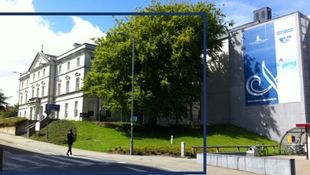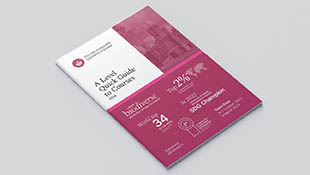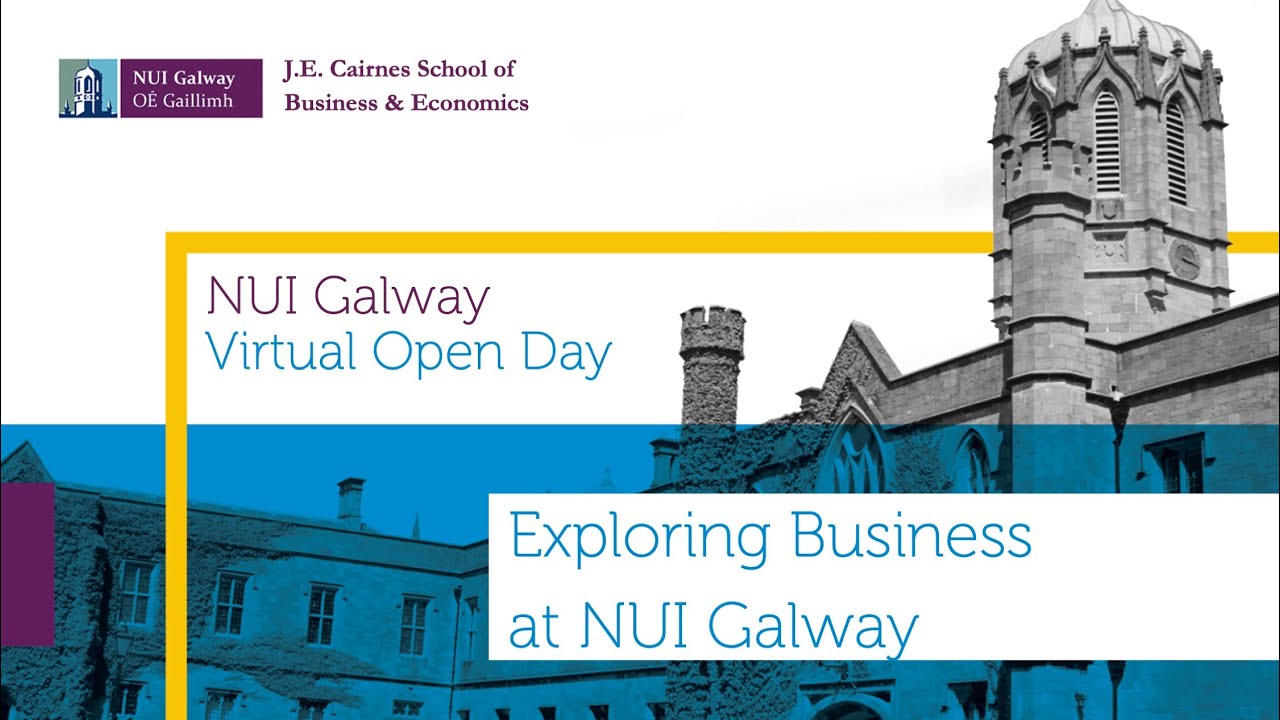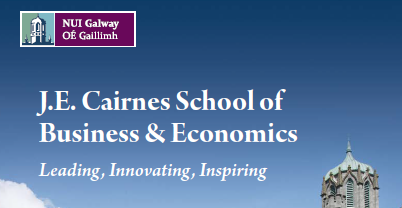-
Courses

Courses
Choosing a course is one of the most important decisions you'll ever make! View our courses and see what our students and lecturers have to say about the courses you are interested in at the links below.
-
University Life

University Life
Each year more than 4,000 choose University of Galway as their University of choice. Find out what life at University of Galway is all about here.
-
About University of Galway

About University of Galway
Since 1845, University of Galway has been sharing the highest quality teaching and research with Ireland and the world. Find out what makes our University so special – from our distinguished history to the latest news and campus developments.
-
Colleges & Schools

Colleges & Schools
University of Galway has earned international recognition as a research-led university with a commitment to top quality teaching across a range of key areas of expertise.
-
Research & Innovation

Research & Innovation
University of Galway’s vibrant research community take on some of the most pressing challenges of our times.
-
Business & Industry

Guiding Breakthrough Research at University of Galway
We explore and facilitate commercial opportunities for the research community at University of Galway, as well as facilitating industry partnership.
-
Alumni & Friends

Alumni & Friends
There are 128,000 University of Galway alumni worldwide. Stay connected to your alumni community! Join our social networks and update your details online.
-
Community Engagement

Community Engagement
At University of Galway, we believe that the best learning takes place when you apply what you learn in a real world context. That's why many of our courses include work placements or community projects.
Commerce with French
Course Overview
This exciting four-year course in Commerce with a modern French will allow you to develop your language skills and live abroad while gaining valuable insights into international business and culture.It is the ideal international qualification for students who want to build an exciting career in another country or in an international firm, or who wish to significantly expand their career choices.
The large range of subjects in the first two years of the programme give students a broad knowledge of business and allows them to decide which area of business is best for them.In third year, students spend a year abroad studying modules in languages and business at an approved university. Students have the opportunity to study abroad at some of the world’s most elite universities and business schools, and gain an alternative perspective on education in another country. The international year provides students with the opportunity to experience a new culture and build a network of global connections. You will also develop your cross cultural awareness and communication skills.
Applications and Selections
Who Teaches this Course
Requirements and Assessment
Key Facts
Entry Requirements
Minimum Grade H5 in two subjects and passes in four other subjects at O6/H7 level in the Leaving Certificate, including Irish, English, another language, Mathematics, and any two other subjects recognised for entry purposes.
Additional Requirements
For A-Levels - Grade B in French
Recognition of Prior Learning (RPL)
Duration
4 years
Next start date
September 2024
A Level Grades (2023)
universityofgalway.ie/alevels
Average intake
15
QQI/FET FETAC Entry Routes
Closing Date
NFQ level
8
Mode of study
ECTS weighting
Award
CAO
GY202
Course code
Course Outline
Course Outline - Year 1
- Principles of Microeconomics/Macroeconomics
- Introduction to Management Accounting/Financial Accounting
- Business Information Systems and Information Management for Business
- French
- Mathematics for Business
- Data Science for Business Analytics I
- Management: Enterprise and Society
- Foundations of Marketing Thought
Course Outline - Year 2
- French
- Applied Microeconomics for Business
- Management Accounting I
- Organisational Psychology
- Business Finance I
- Macroeconomics & the Business Environment or Business Law I
- Data Science for Business Analytics II
- Consumer Behaviour
- HRM & Decent Work
- Plus one optional subject from the following:
- International Financial Reporting I
- Economics of Public Policy
- Introduction to Financial Economics
- Introduction to Sustainability 2
- Entrepreneurial Venture Development
- Marketing & Sustainability
- Cybersecurity
Course Outline - Year 3
- Students follow courses in languages and business studies at a university in France.
Course Outline - Year 4
- Ireland in the Global Economy
- Strategy
- Innovation, Creativity and Enterprise
- French
- Plus the opportunity to choose courses from the following areas:
- Accounting & Performance Measurement
- Economics and Public Policy
- Management of Human Resources
- Management Information Systems
- Marketing Management
- Business Law
- Operations/Logistics
- Digital Business and Analytics
- International Business
- Enterprise
Curriculum Information
Curriculum information relates to the current academic year (in most cases).Course and module offerings and details may be subject to change.
Glossary of Terms
- Credits
- You must earn a defined number of credits (aka ECTS) to complete each year of your course. You do this by taking all of its required modules as well as the correct number of optional modules to obtain that year's total number of credits.
- Module
- An examinable portion of a subject or course, for which you attend lectures and/or tutorials and carry out assignments. E.g. Algebra and Calculus could be modules within the subject Mathematics. Each module has a unique module code eg. MA140.
- Subject
- Some courses allow you to choose subjects, where related modules are grouped together. Subjects have their own required number of credits, so you must take all that subject's required modules and may also need to obtain the remainder of the subject's total credits by choosing from its available optional modules.
- Optional
- A module you may choose to study.
- Required
- A module that you must study if you choose this course (or subject).
- Required Core Subject
- A subject you must study because it's integral to that course.
- Semester
- Most courses have 2 semesters (aka terms) per year, so a three-year course will have six semesters in total. For clarity, this page will refer to the first semester of year 2 as 'Semester 3'.
Year 1 (60 Credits)
Required MG3116: Management: Enterprise and Society - 5 Credits - Semester 1Required EC139: Principles of Microeconomics - 5 Credits - Semester 1
Required AY104: Introduction to Financial Accounting - 5 Credits - Semester 1
Required MA119: Mathematics for Business - 5 Credits - Semester 1
Required MS120: Business Information Systems - 5 Credits - Semester 1
Required FR105: French - 10 Credits - Semester 1
Required ST1120: Data Science for Business Analytics I - 5 Credits - Semester 2
Required MS1100: Information Management for Business - 5 Credits - Semester 2
Required MK1100: Foundations of Marketing Thought - 5 Credits - Semester 2
Required AY105: Introduction to Management Accounting - 5 Credits - Semester 2
Required EC141: Principles of Macroeconomics - 5 Credits - Semester 2
Year 2 (60 Credits)
Required MG3121: Leading Individuals, Teams and Projects - 5 Credits - Semester 3Required MK206: Consumer Behaviour - 5 Credits - Semester 3
Required ST2120: Data Science for Business Analytics II - 5 Credits - Semester 3
Required EC2100: Applied Microeconomics for Business - 5 Credits - Semester 3
Required FR255: French - 5 Credits - Semester 3
Required AY207: Management Accounting I - 5 Credits - Semester 3
Optional MG3118: HRM & Decent Work - 5 Credits - Semester 4
Optional LW190: Business Law 1 - 5 Credits - Semester 4
Optional EC247: Introduction to Financial Economics - 5 Credits - Semester 4
Optional AY208: Business Finance I - 5 Credits - Semester 4
Optional EC259: Economics of Public Policy - 5 Credits - Semester 4
Optional AY209: International Financial Reporting I - 5 Credits - Semester 4
Optional MG2101: Entrepreneurial Venture Development - 5 Credits - Semester 4
Optional EC2101: Macroeconomics and the Business Environment - 5 Credits - Semester 4
Optional MS2100: Cybersecurity - 5 Credits - Semester 4
Optional MK2102: Marketing & Sustainability - 5 Credits - Semester 4
Optional BSS2104: Introduction to Sustainability 2 - 5 Credits - Semester 4
Required FR256: French - 15 Credits - Semester 4
Year 4 (60 Credits)
Optional MS321: Web & Interactive Media Design - 5 Credits - Semester 7Optional MK314: Media & Marketing Communications - 5 Credits - Semester 7
Optional MK311: The Marketing of Services - 5 Credits - Semester 7
Optional MG328: Human Resource Management - 5 Credits - Semester 7
Optional MS325: Contemporary Project Management - 5 Credits - Semester 7
Optional MS414: Business Intelligence and Analytics - 5 Credits - Semester 7
Optional AY308: Taxation I - 5 Credits - Semester 7
Optional MS323: User Experience Design - 5 Credits - Semester 7
Optional EC345: Health Economics - 5 Credits - Semester 7
Optional EC369: Money And Banking - 5 Credits - Semester 7
Optional AY321: Management Accounting II - 5 Credits - Semester 7
Optional AY325: International Financial Reporting II - 5 Credits - Semester 7
Optional IE309: Operations Research - 5 Credits - Semester 7
Optional MS218: Database Technologies - 5 Credits - Semester 7
Optional MK3101: Cases in Marketing Strategy - 5 Credits - Semester 7
Optional EC3101: Microeconomics and Public Policy - 5 Credits - Semester 7
Optional EC388: Environmental And Natural Resource Economics - 5 Credits - Semester 7
Optional EC3105: Econometrics - 5 Credits - Semester 7
Optional MK3104: Marketing Research - 5 Credits - Semester 7
Optional MG3110: Entrepreneurship - 5 Credits - Semester 7
Optional MG3111: Entrepreneurial Finance - 5 Credits - Semester 7
Optional MG3113: Megatrends - 5 Credits - Semester 7
Optional ST311: Applied Statistics I - 5 Credits - Semester 7
Optional MS3110: The Future of Technology in Work and Society I - 5 Credits - Semester 7
Optional MG3120: Ethical, Responsible and Sustainable Business - 5 Credits - Semester 7
Required EC423: Ireland in the Global Economy - 5 Credits - Semester 7
Required FR355: French - 5 Credits - Semester 7
Optional MG326: Employee Relations: Rights And Obligations - 5 Credits - Semester 7
Optional EC382: International Economics - 5 Credits - Semester 7
Optional MK303: Global Marketing - 5 Credits - Semester 8
Optional MG323: International Business - 5 Credits - Semester 8
Optional MS319: Enterprise Systems - 5 Credits - Semester 8
Optional EC362: Economics Of Financial Markets - 5 Credits - Semester 8
Optional EC386: Public Economics - 5 Credits - Semester 8
Optional AY322: Management Accounting III - 5 Credits - Semester 8
Optional AY319: Taxation II - 5 Credits - Semester 8
Optional AY314: Business Finance II - 5 Credits - Semester 8
Optional AY326: International Financial Reporting III - 5 Credits - Semester 8
Optional MK341: Brand Management - 5 Credits - Semester 8
Optional MK3103: Digital Marketing Planning - 5 Credits - Semester 8
Optional EC3102: Macroeconomics and Public Policy - 5 Credits - Semester 8
Optional MG3102: Work in a Global Context - 5 Credits - Semester 8
Optional MS4101: Implementing Digital Innovation - 5 Credits - Semester 8
Optional EC3100: Economics and Philosophy - 5 Credits - Semester 8
Optional MK3105: Marketing Analytics - 5 Credits - Semester 8
Optional ME353: Quality Systems - 5 Credits - Semester 8
Optional MG3112: Entrepreneurial Leadership and Management - 5 Credits - Semester 8
Optional MG3114: Founder Selling - 5 Credits - Semester 8
Optional EC429: Marine Economics - 5 Credits - Semester 8
Optional EC3106: Behavioural Finance - 5 Credits - Semester 8
Optional ST312: Applied Statistics II - 5 Credits - Semester 8
Optional EC357: Development Economics - 5 Credits - Semester 8
Optional EC3104: Agricultural and Food Economics - 5 Credits - Semester 8
Required MG3119: Strategy - 5 Credits - Semester 8
Required MG3109: Innovation, Creativity and Enterprise - 5 Credits - Semester 8
Required FR356: French - 15 Credits - Semester 8
Optional MK316: Social and Non-Profit Marketing - 5 Credits - Semester 8
Further Education
Graduates can also go on to select from a range of postgraduate programmes in their chosen discipline at the J.E. Cairnes School of Business and Economics.
Why Choose This Course?
Career Opportunities
French is rated as the third most useful language for business, behind only English and Chinese. Our students acquire a high level of communication skills, finding employment in a wide variety of situations, both in Ireland and abroad, including education, administration, media, marketing, translation and interpreting. Graduates of this programme have found employment in: EU institutions, accounting, management consultancy, marketing, human resource management, finance (including banking & insurance), and economic policy advisory services.
Why Study French?
- French is one of the most widely spoken languages in the world, both as a first language, mainly in Europe and North America, and as a second language globally, including many parts of Africa.
- Students of French acquire a high level of written and spoken skills so that they can communicate accurately and effectively.
International Study Abroad
In year three of this programme students study courses in language and business at a university in France, during which you will significantly enhance both your linguistic abilities and your intercultural skills.
Click here to see where your Commerce degree can take you in the world!
Innovation: Creativity and Enterprise (ICE) - A partnership with business to drive innovation with students
Final year students in the J.E. Cairnes School of Business & Economics are provided with the opportunity to put the business knowledge they have gained through their studies into practice through a module in Innovation: Creativity and Enterprise (ICE). Developed in conjunction with entrepreneur Pádraig O’Céidigh, the module involves partnering with local business leaders to provide opportunities for all students to engage in projects, requiring them to innovate in a variety of interesting areas in a business or community setting. More than 30 local business and community leaders get involved each year, mentoring students in group-based projects, requiring them to innovate in a variety of interesting areas.
Who’s Suited to This Course
Learning Outcomes
Transferable Skills Employers Value
Work Placement
Study Abroad
Related Student Organisations
Course Fees
Fees: EU
Fees: Tuition
Fees: Student Contribution
Fees: Student levy
Fees: Non EU
EU Fees are comprised of Tuition + Student Contribution Charge + Student Levy** €140. **Payable by all students and is not covered by SUSI. Further detail here.
Find out More
- J.E. Cairnes School of Business and Economics, University of Galway
- T + 353 (0)91 492 612
- E business@universityofgalway.ie
What Our Students Say
Ellen Murray | Bachelor Commerce International with French
The range of topics and different pathways you can take is something that really attracted me to the course. The language option has really given me a broad-rounded education. I can’t imagine where my life would be now without French. I absolutely love it. Initially I wasn’t too sure whether my language skills would be able for the course however our French lecturer is unbelievable, and it gives edge to your personal profile - especially to employers.

Niamh Prendergast | Final Year BComm International with French student
The small class size and the close one to one contact with the French coordinator helped develop my French. I learnt about the French business system strengthening my global business knowledge which future employers will value. We also focused on written, oral and grammar skills which improved my confidence and ability to communicate with French people on my study abroad in Strasbourg. The year abroad was a “once in a lifetime” opportunity. I travelled across Europe getting a flavour for different cultures and nationalities as well as getting an insight into the French education system.in Connect with Niamh

David O' Malley | Audit Trainee at KPMG
I spent my year abroad in Montpellier, France. The fact that I would have a year abroad was one of the main reasons as to why I decided to pick Commerce with French in the first place. It was an unbelievable experience. Living in France and speaking French to French people on a daily basis improved both my confidence and language skills immensely. My Erasmus year gave me the opportunity to make a lot of friends from all over the world who I am still in contact with today. I was also fortunate enough to travel during my year abroad. I got to see Barcelona play in the Nou Camp and see Ireland play France in Paris.
Undergraduate Virtual Hub
Visit our CAO undergraduate hub for more information, blogs, podcasts and videos on demand.
AACSB - Global Accreditation

AACSB is the longest-serving global accrediting body for business schools, and the largest business education network connecting students, educators, and businesses worldwide
Downloads
-
.png)
Business Undergraduate Prospectus 2024 PDF (1.57MB)
-

BComm International with French PDF (4.7 MB)
-

Undergraduate Prospectus 2024 PDF (14.6MB)
-

Quick Guide to Courses 2024 PDF (362 KB)
-

A Level Quick Guide 2024 PDF (337 KB)
-

Postgraduate Prospectus 2024 PDF (3.3MB)
-
Business Undergraduate Prospectus 2021-22 PDF (1.57MB)








.jpg)
.jpg)










